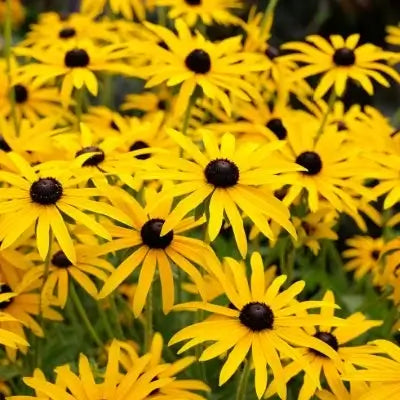Solomon's Seal (Polygonatum) is an enchanting perennial that has earned its place in many gardens for its graceful arching stems and delicate bell-shaped flowers. Its unassuming beauty adds a natural elegance to shaded areas, making it a favorite for gardeners who seek plants with subtle charm. If you want to add a plant that offers more than just seasonal blooms, Solomon's Seal could be the perfect addition to your garden. Let's dive deeper into what makes this plant a reliable and desirable choice.
Does Solomon's Seal Come Back Every Year?
Yes, Solomon's Seal is a reliable perennial that returns year after year, steadily increasing in size and beauty. Its ability to thrive in the same spot for many seasons makes it a low-maintenance option for gardeners who prefer plants that do not require constant replanting or fuss. Once established, Solomon's Seal rewards you with its elegant presence every spring, sending up new shoots that unfurl into arching stems. Often highlighted with small, white, or greenish flowers, these stems dangle gracefully, adding a delicate texture to shaded garden spaces.

While some perennials may struggle with fluctuating weather conditions, Solomon's Seal is relatively resilient. It is particularly well-suited to cooler climates, where it can go dormant in the winter and emerge refreshed each spring. Its foliage even turns a soft, buttery yellow in the fall, adding seasonal interest long after its flowers have faded.
How Fast Does Solomon's Seal Spread?
Solomon's Seal spreads moderately through its rhizomatous roots, making it an excellent choice for gardeners looking to gradually fill a shady area. Unlike aggressive spreaders that can take over a garden in no time, Solomon's Seal expands its territory at a measured and controlled rate. Each year, the plant sends underground rhizomes that sprout new growth a short distance from the parent plant.
This controlled spread allows for a natural look, creating a lush, cohesive display over time. Given its gentle pace, Solomon's Seal is often used as a border or understory plant, pairing beautifully with other shade-loving companions like ferns, hostas, and hellebores. You may notice a well-established colony in three to five years, perfect for creating a woodland garden feel. Its subtle expansion also means it can be divided and replanted elsewhere in your garden without becoming overwhelming.

When Can I Buy Solomon's Seal?
Solomon's Seal can typically be purchased during the spring and early fall, which are the ideal times for planting. Nurseries and online retailers often have the best stock in springtime, as the plant begins to emerge from dormancy and is ready to establish itself in your garden. However, fall is also an excellent time to buy and plant Solomon's Seal, as cooler temperatures and steady moisture help the plant settle in before the winter freeze.
If you're purchasing from a local nursery, look for vigorous, healthy plants with no signs of wilting or root rot. Bare-root Solomon's Seal is also available from online sellers, especially during the spring. Bare-root plants are a convenient option and generally transplant easily if kept moist until they're placed in the soil.
Is Solomon's Seal Invasive?
Despite its spreading nature, Solomon's Seal is not considered invasive. It spreads at a rate that is easy to control and rarely aggressively encroaches on neighboring plants. Its rhizomes spread gently and evenly, making it a plant you can confidently include in your garden without fear of overtaking more delicate companions.

Solomon's Seal is often valued for its ability to fill spaces that might otherwise be difficult to plant. Its spreading habit works in your favor when creating your ground cover in shaded areas, as it helps suppress weeds and fills in empty patches of soil. Unlike invasive species that can choke out other plants and disturb the ecosystem, Solomon's Seal maintains a peaceful coexistence with its garden companions. Its gradual spread makes it an ideal candidate for naturalistic landscapes where you want to encourage plants to intermingle rather than compete for space.
A Versatile Addition to Any Shaded Garden
Solomon's Seal has long been a favorite among gardeners for its ability to return each year, graceful form, and adaptability. It flourishes in part to full shade, making it an excellent solution for tricky garden spots where sunlight is sparse. Although it prefers rich, well-drained soil, Solomon's Seal is quite adaptable and can tolerate various dirt, like clay and sandy soils, as long as some organic matter is present.
Once established, this perennial requires very little care. Once mature, it is drought-tolerant, although it does appreciate occasional watering during dry periods. Deer and rabbits tend to avoid Solomon's Seal, which makes it an ideal plant for woodland gardens or areas where wildlife may otherwise nibble on more delicate plants.

Its understated beauty works well in formal and informal settings, whether cultivating a tranquil woodland garden or filling in shaded borders. The arching stems and delicate flowers create a sense of movement, drawing the eye upwards and across the garden bed, while its fall foliage provides a final burst of color before winter sets in.
For gardeners who appreciate plants that work harmoniously within a landscape, Solomon's Seal offers the perfect balance of elegance, durability, and ease of care. Whether you're a seasoned gardener or just starting your plant collection, Solomon's Seal will bring quiet sophistication to your shaded garden areas.

























































